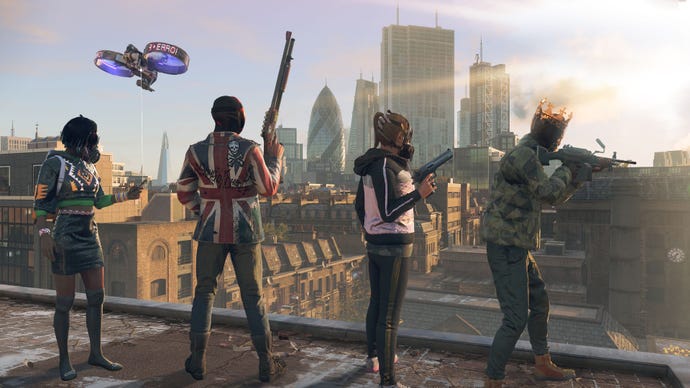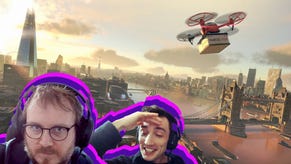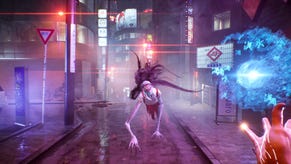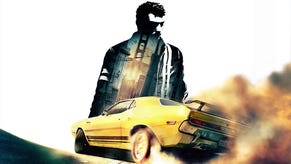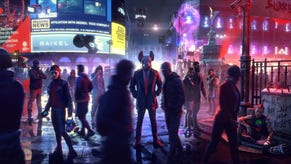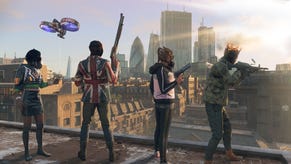Watch Dogs Legion Chose London Before Brexit, But It's Still Ubisoft's Most Political Game to Date
We hands-on with the latest in the Watch Dog's franchise and interview Ubisoft's Clint Hocking.
This article first appeared on USgamer, a partner publication of VG247. Some content, such as this article, has been migrated to VG247 for posterity after USgamer's closure - but it has not been edited or further vetted by the VG247 team.
The evolution of Watch Dogs has been an interesting thing to see. I remember the first trailer at E3 2012, which presented the dream of hacking everything, but the final product fell short of that promise. Then came Watch Dogs 2, which found its roots in the life of young black hacker Marcus Holloway in his friends in hacker collective DedSec. It was a better game than the first; Marcus was more interesting than Watch Dogs' revenge-driven sad uncle Aiden Pierce, and it felt like WD2 at least vaguely commented on our reality.
The next Watch Dogs is expanding on Watch Dogs 2 with a near-future London. And this time, the hero of our story is... whoever you want it be. The core of Watch Dogs Legion is that any character in the world is playable. All of their lives and stories are open to you, the player.
This future version of London is still a beautiful metropolitan sprawl, but it's also one that controlled with an iron glove. The paramilitary group Albion patrols the streets. Much like the London of today, surveillance cameras watch the populace's every move. There are immigration checkpoints and prison camps. And into this authoritarian regime, DedSec decides to being a new cell to reach out to the people and turn them against their masters. While Watch Dogs Legion is a fictional story, it's rooted in real-world problems.
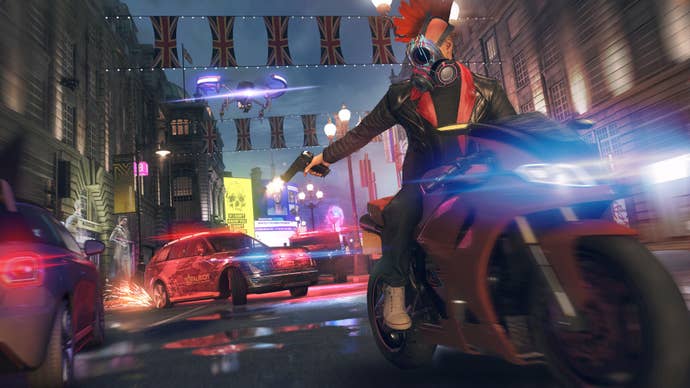
"The first game, you play as a lone hero who works with DedSec. The second one, a team of people who are DedSec. This was a natural extension of that. Now we're going to build our own DedSec," says Watch Dogs Legion creative director Clint Hocking. "Thematically, it was also really important for us, because we're talking about a world where people are increasingly divided. Powerful forces, private corporations, the wealth gap; it's driving a wedge between people. Pitting them against each other. We wanted to make a game about different people with different perspectives. Different opinions and worldviews putting aside their differences and coming together to fight back against that pressure that's trying to drive us apart."
On a moment-to-moment basis, Watch Dogs Legion still feels like the past games. Hacking has you jumping between cameras, terminals, and radios to affect the environment. You can take control of vehicles or traffic lights to cause distractions. And you can look into mobile devices to take a look at their owner's personal lives.
Ubisoft has blown up this part of the simulation. Characters have their own lives and patterns; you can follow someone around London to get a feel for who they are. When you hack into their devices, you can see the things they care about, and who their close personal relationships are. And every single person is a potential recruit for your version of DedSec. Once they are a part of the team, they're the stars of the story. They appear in cutscenes, their interactions with story characters are based on who they are.
"It's just that you can play how you want to play, you can be whoever you want to be. We want you to be able to find people in the world who you're interested in. Engage with their problems, figure out their life, win them over to your cause, recruit them onto your team, and then they become the star of your story," says Hocking. "They appear in your cutscenes, they have their own personal journeys, and their own animations. Every scene you see is going to be different depending on which characters you've recruited and who are your personal stars. It changes storytelling in radical ways. The game becomes much more of an ensemble."
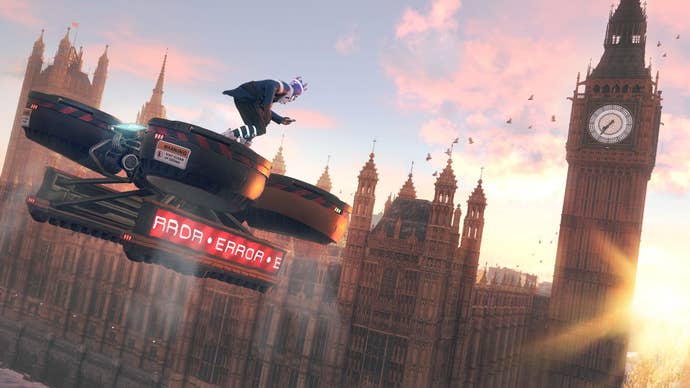
I started as a young woman named Ruby, but started to recruit a middle aged man named David. While Ruby definitely felt very DedSec, in trendy attire and a stylish undercut, David was dressed in a vest and longcoat, with flat cap adorning his balding head. When I talked with him, he spoke with a Cockney accent. His brother was recently arrested, and another family member was a sex worker. And he had a little personal trouble with the law, which was my way into his life. There's far more data on each person in Watch Dogs Legion, making for a larger simulation.
"An enormous amount of effort went into supporting our innovations, both from building the underlying simulation and relational database that assembles people, and the cinematic and storytelling side," explains Hocking when I asked about the effort put into simulating the entire populace of future London. "At Ubisoft we always try to make very systemic games. Part of making a simulation of the population meant that simulation being non-player-centric. It meant the way people live their lives wouldn't necessarily only be about what you do. Just because you recruit someone into your team, they don't stop being a part of the simulation. They still have their friends, they still have their families. They still go to their schedules. When you switch to them, they're still living their lives."
Quid pro quo is the focus of Legion's gameplay. David was neutral on DedSec, so I needed to change his opinion of the movement. This meant helping me or his family and friends out of trouble. I snuck into a police station with Ruby, jumping from camera-to-camera until I found a digital key to the server room. Then I used a new gadget: a handy controllable spiderbot. I threw the spiderbot up near the server room, and then used my new little friend to physically delete David's criminal record. That's one way to make a new friend.
Each person also has perks and advantages related to gameplay. I chose to help David because his perks were interesting to me: he had a 100% bonus to melee attacks, while his disadvantage was he could just die randomly. I was hoping that the latter would happen, but it never did. Once David was a part of my team, I was able to switch to him at any time. And this drastically changed story-based cutscenes: while Ruby was forceful and defiant, David was a bit more curt, with a darker sense of humor. Watch Dogs Legion changes depending on who your chosen cast is. Do you want a DedSec full of women, or only those related to the financial industry? Or maybe you prefer a purely octogenarian DedSec; the trailer for Watch Dogs Legion actually shows a kindly old granny putting a bullet in the skull of an Albion soldier. Your squad, your choice.
"Being able to have dynamically-altered cutscenes, dynamic placement of the camera and lighting setups based on how tall a character is or the color of a character's skin. How long a character's line is, and the way they would interact changes. All of that technology has to be able to adapt to anyone," Hocking tells me. Every character in your squad can get arrested for their actions, or killed outright. And death is permanent, meaning you might lose a favorite if you go in without a plan. If you happen to lose your entire squad, don't worry, because you've probably helped some people along the way, who might decide enough is enough and join your team.
Hocking says London was chosen to "extend the scope" of Watch Dogs, given that the first two games took place in the United States. While your personal DedSec cell in London is the focus, there are also missions where you'll interact with other cells around the world. DedSec is worldwide, baby.
Part of the fiction of Watch Dogs Legion's world puts this nebulous near-future after the outcome of the Brexit vote in the United Kingdom. Hocking makes it clear that Legion's setting and themes actually preceded Brexit, but the team felt it was worth acknowledging thematically.
"To be clear, we've been working on this game for four years. When we started working on this game, we chose London, we chose 'play anyone' before the Brexit vote happened," he tells USG. "When it happened we had to figure out how to reconcile that with our world. The reality is, we decided we wouldn't try to hide it or pretend it didn't happen. It's a thing that happened in our backstory. The message of our game is really about people coming together. It's not that Brexit is the cause. The problems that cause Brexit, the increasing wealth gap, the rise of authoritarianism, the sabotaging of democracy; all of these things are the themes of our game."
Honestly after spending some time with Watch Dogs Legion, I can't wait to build my own weird, idiosyncratic DedSec. Moving beyond a single hero is a fantastic idea, and I can already imagine myself cruising the streets of future London, in search of Glasses and Tie Squad. Watch Dogs Legion is coming to PC, PlayStation 4, Xbox One, and Google Stadia on March 6th, 2020.
